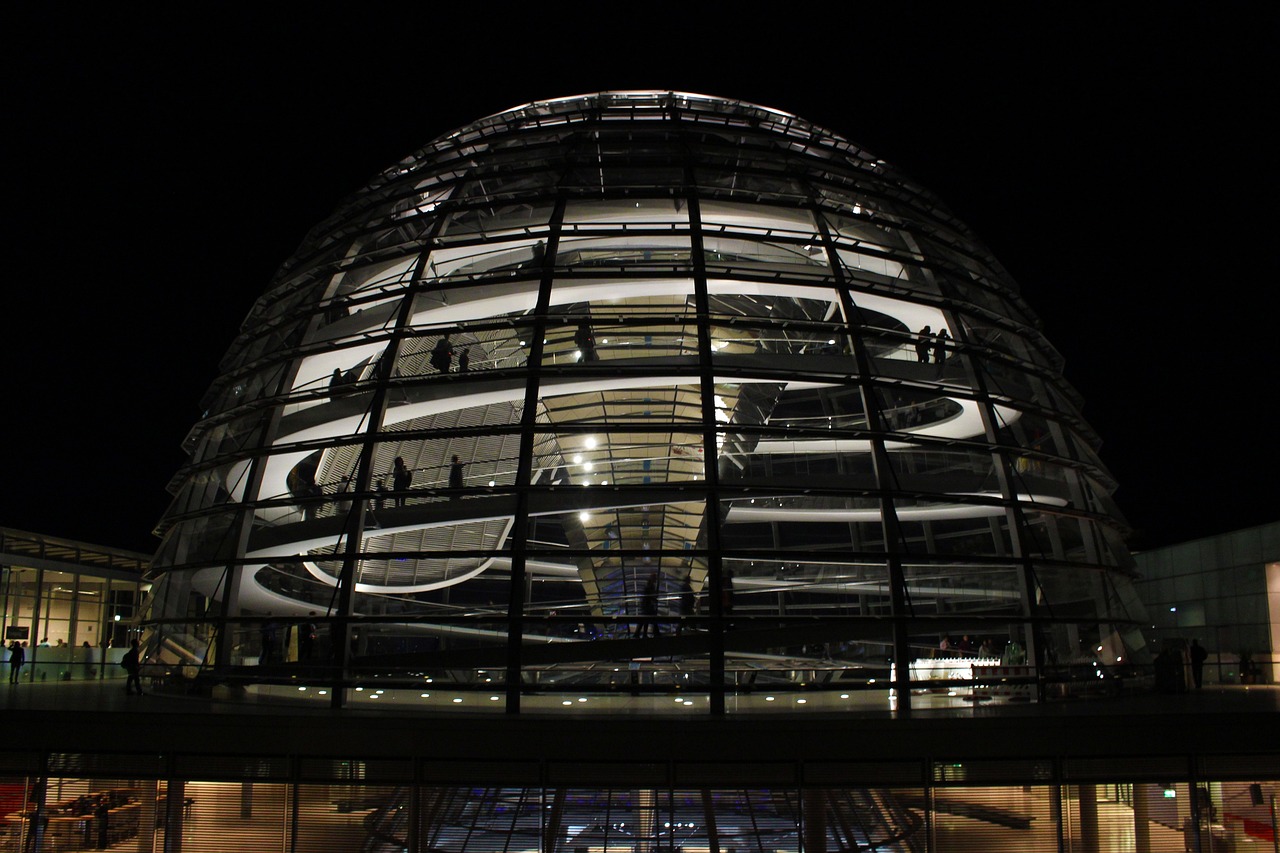Philosophy and the Future of Politics
In a world that seems to be constantly evolving, the intersection of philosophy and politics becomes increasingly significant. Imagine a vast landscape where ideas shape the very fabric of governance, influencing everything from the laws we follow to the leaders we choose. As we dive into this intricate relationship, we uncover how philosophical concepts have not only laid the groundwork for political theories but also how they continue to mold our understanding of societal structures. The future of politics is not just a matter of policies and elections; it is deeply intertwined with the philosophical underpinnings that guide our collective decisions. So, what does this mean for us? It means that as we navigate through challenges like climate change, technological advancements, and social justice, our philosophical beliefs will play a crucial role in determining the paths we take.
Political philosophy serves as the bedrock of our political systems, offering the essential principles that guide governance. To truly grasp contemporary political debates, we must first understand the evolution of these philosophical ideas. Think of political philosophy as a map—one that helps us navigate the complex terrain of human interaction and governance. By studying its development, we can better appreciate the nuances of today's political landscape and anticipate the potential directions politics may take in the future. It’s like looking at a tree; understanding its roots allows us to see how its branches might grow in different directions, influenced by the environment around it.
Ethics is the compass that guides political decision-making. It’s not just about what laws are enacted, but about the moral responsibilities that leaders hold in shaping a just society. When we think about governance, we often overlook the ethical frameworks that underpin policies. These frameworks are akin to the rules of a game; they determine how we play and what we value. For instance, when leaders make decisions, they must consider not only the outcomes but also the ethical implications of their actions. This leads us to a critical question: how do we ensure that our leaders remain accountable to these ethical standards?
Utilitarianism is a key ethical theory that prioritizes the greatest good for the greatest number. In policymaking, this principle can be incredibly powerful, guiding decisions that aim to benefit the majority. However, it also presents challenges, particularly when it comes to balancing individual rights against collective welfare. Imagine a seesaw; on one side, we have the needs of the many, and on the other, the rights of the few. Striking the right balance is crucial, yet often difficult. This approach can lead to policies that, while popular, may inadvertently marginalize minority groups. So, how do we navigate this complex landscape?
Critics of utilitarianism argue that it can sometimes overlook the rights of minorities, leading to ethical dilemmas that challenge its effectiveness as a guiding principle in governance. These critiques highlight the importance of considering diverse perspectives in political philosophy. It’s like trying to paint a masterpiece; if you only use one color, the result will be flat and uninspired. By incorporating a spectrum of ideas and values, we can create a more vibrant and inclusive political landscape.
To understand the practical implications of utilitarianism, we can look at real-world case studies. For instance, public health policies often reflect utilitarian principles, where decisions are made to maximize overall health outcomes. However, these decisions can lead to ethical dilemmas, such as prioritizing resources for the majority at the expense of vulnerable populations. By examining these examples, we can assess the effectiveness of utilitarian principles in governance and the ethical challenges that arise.
On the other side of the ethical spectrum, we have deontological ethics, which emphasizes rules and duties. This framework is essential in analyzing political obligations, as it provides a set of moral imperatives that guide leaders in their decision-making processes. Imagine a traffic light; it dictates when to stop and when to go, ensuring order and safety. Similarly, deontological ethics offers a structure that helps maintain ethical governance, reminding leaders of their responsibilities to uphold justice and fairness.
Democracy is deeply rooted in philosophical thought, with key concepts that underpin its structure and function. The principles of democracy are not just arbitrary rules; they are grounded in philosophical inquiry that seeks to understand human nature and the role of government. This exploration is vital in contemporary political discourse, as it allows us to reflect on the values that define our democratic systems.
One of the cornerstones of democratic philosophy is social contract theory, which posits that governments derive their authority from the consent of the governed. This idea has historical significance, shaping the development of democratic governance throughout the ages. It’s like a handshake; it represents an agreement between the people and their leaders, emphasizing mutual respect and accountability. In modern interpretations, this theory continues to influence our understanding of citizenship and civic duties.
Despite its foundational principles, democracy faces numerous challenges today, including the rise of populism and authoritarianism. These threats can undermine the very ideals that democracy stands for. Philosophical discourse plays a crucial role in navigating these complexities, providing insights that can help us defend and strengthen our democratic institutions. It’s a bit like a lighthouse guiding ships through a storm; philosophical ideas can illuminate the path forward in turbulent times.
As society evolves, so too must our political models. The future of governance will likely be influenced by philosophical advancements and emerging global challenges, such as technology and climate change. Envision a world where political systems are adaptive and responsive, much like a chameleon that changes its color based on its environment. By integrating philosophical insights with practical governance, we can create political models that are not only effective but also equitable and just.
- What is the relationship between philosophy and politics? Philosophy provides the foundational principles that shape political theories and practices, influencing governance and societal structures.
- How does ethics impact political decision-making? Ethics guides leaders in making moral choices that affect society, ensuring that policies are just and equitable.
- What are the challenges to democratic ideals today? Challenges include the rise of populism and authoritarianism, which threaten the principles of democracy.
- How can philosophy inform future political models? By integrating philosophical insights with practical governance, we can develop adaptive political systems that address contemporary challenges.

The Role of Political Philosophy
Political philosophy serves as the bedrock upon which political systems are built. It is not merely an academic exercise; rather, it is a vibrant field that actively shapes the way societies are governed. By examining the evolution of political thought, we can gain insights into the current political landscape and speculate on its future trajectory. Just like a compass guides a traveler, political philosophy provides direction for lawmakers and citizens alike, helping them navigate the complexities of governance.
At its core, political philosophy grapples with fundamental questions about power, justice, rights, and the role of the state. These inquiries are not trivial; they influence the laws that govern our lives and the policies that affect our communities. For instance, consider the principles of liberty and equality. These concepts have been central to political discourse for centuries, yet their interpretations and applications continue to evolve. Understanding these philosophical underpinnings helps us grasp why certain political movements gain traction while others falter.
Moreover, political philosophy encourages critical thinking and debate. It challenges us to ask tough questions: What is the purpose of government? Who should wield power? How do we ensure that all voices are heard? These questions are crucial, especially in an era marked by polarization and rapid change. Political philosophers like John Locke, Karl Marx, and John Stuart Mill have laid the groundwork for these discussions, each offering unique perspectives that still resonate today.
In contemporary politics, the influence of philosophical ideas can be seen in various arenas, including legislation, public policy, and international relations. For example, the concept of social justice has gained prominence, prompting debates about wealth distribution and systemic inequality. How do we balance individual rights with the collective good? This tension is at the heart of many political discussions and is a testament to the enduring relevance of political philosophy.
Furthermore, the role of political philosophy extends beyond mere theory; it actively informs practice. Political leaders often draw on philosophical principles to justify their policies and actions. For instance, the ethical implications of a government’s decision to intervene in a foreign conflict can be analyzed through various philosophical lenses, including utilitarianism and deontology. This intersection of theory and practice highlights the importance of philosophical inquiry in shaping not only political ideologies but also the very fabric of society.
As we look to the future, the role of political philosophy will only become more significant. With emerging challenges such as climate change, technological advancements, and global inequality, philosophical frameworks will be essential in guiding our responses. Will we prioritize the needs of the many over the few? How will we redefine democracy in a digital age? These questions underscore the pivotal role that political philosophy plays in shaping our collective future.
In summary, political philosophy is not just a relic of the past; it is a dynamic field that continues to influence contemporary politics. By understanding its role, we can better navigate the complexities of governance and work toward a more just society. The ideas and debates that emerge from this discipline are crucial as we strive to create political systems that reflect our values and aspirations.

Ethics in Governance
In the realm of politics, ethics is not just a buzzword; it is the very foundation upon which effective governance stands. Imagine a ship navigating through turbulent waters; without a reliable compass, the crew may find themselves lost at sea. Similarly, ethical principles serve as the compass for political leaders, guiding their decisions and actions toward the greater good. But what does it mean to govern ethically in today's complex world? It encompasses a wide array of responsibilities, from ensuring transparency and accountability to promoting justice and equity in society.
One of the most pressing questions in political ethics is: how do leaders balance their personal beliefs with the needs and values of the populace they serve? This is where ethical frameworks come into play. They provide a structured approach for leaders to evaluate their choices. For instance, many politicians adhere to principles derived from various ethical theories such as utilitarianism, which emphasizes outcomes, or deontology, which focuses on duties and rules. Understanding these frameworks is crucial, as they shape policies that affect millions of lives.
Moreover, the moral responsibilities of leaders extend beyond mere policy-making. They must also cultivate a culture of ethical behavior within their organizations and among their constituents. This involves fostering an environment where ethical dilemmas can be openly discussed and addressed. When leaders prioritize ethics, they not only enhance their credibility but also build trust with the public, which is essential for a healthy democracy.
To illustrate the importance of ethics in governance, let's consider the following table that highlights key ethical principles and their implications for political leaders:
| Ethical Principle | Description | Implications for Governance |
|---|---|---|
| Transparency | Open communication regarding decisions and actions. | Builds trust with the public and reduces corruption. |
| Accountability | Responsibility for actions and decisions. | Ensures leaders are answerable to the public. |
| Equity | Fair treatment of all individuals. | Promotes social justice and reduces inequality. |
| Integrity | Adherence to moral and ethical principles. | Enhances credibility and public confidence in governance. |
As we navigate through the complexities of modern governance, it is essential to recognize that ethical decision-making is not always black and white. Leaders often face dilemmas where they must weigh competing values and interests. For example, a government might need to decide between implementing a policy that benefits the majority but marginalizes a minority group. In such cases, ethical frameworks can serve as valuable tools for analysis and reflection, helping leaders arrive at more just and equitable decisions.
In conclusion, ethics in governance is not merely an academic concept; it is a practical necessity. As we look to the future, the role of ethics in politics will only grow more critical. With challenges such as climate change, technological advancements, and social inequality on the horizon, leaders must remain steadfast in their commitment to ethical governance. By doing so, they can pave the way for a more just and equitable society, ensuring that their legacies are not just defined by policies but by the ethical principles that guided their decisions.
- What is the importance of ethics in governance? Ethics serve as the guiding principles for political leaders, influencing their decisions and actions in a way that promotes trust, accountability, and justice.
- How do ethical frameworks influence political decision-making? Ethical frameworks provide structured approaches for evaluating choices, helping leaders balance personal beliefs with the needs of their constituents.
- What are some key ethical principles in governance? Key principles include transparency, accountability, equity, and integrity, each playing a vital role in fostering a healthy democracy.
- Why is ethical decision-making challenging for leaders? Leaders often face dilemmas where they must weigh competing values and interests, making it difficult to arrive at clear-cut decisions.

Utilitarianism and Policy Making
Utilitarianism, a philosophical doctrine that advocates for actions that maximize happiness and well-being for the majority, plays a significant role in shaping public policy. The core idea is simple yet profound: policies should aim for the greatest good for the greatest number of people. This approach can be incredibly appealing, especially in democratic societies where the welfare of the majority is often prioritized. However, the application of utilitarian principles in policymaking is not without its challenges and controversies.
One of the most compelling aspects of utilitarianism is its ability to provide a clear framework for decision-making. Policymakers can utilize a utilitarian approach to evaluate the potential outcomes of their decisions, weighing the benefits against the costs. For instance, consider a government decision to implement a new healthcare policy. A utilitarian analysis would involve assessing how many people would benefit from improved access to healthcare versus the financial costs and potential drawbacks of the policy. In this way, utilitarianism acts as a guiding star, helping leaders navigate complex choices.
However, the utilitarian approach raises significant ethical questions, particularly regarding the rights of individuals versus the collective welfare. For example, if a policy benefits 100 people but severely harms a single individual, should it still be implemented? This dilemma illustrates a critical tension within utilitarianism: the risk of sacrificing minority rights for the sake of majority happiness. Critics argue that this can lead to a "tyranny of the majority," where the needs and rights of individuals or minority groups are overlooked in favor of policies that serve the larger population.
To fully understand the implications of utilitarianism in policy making, we can examine a few key areas:
- Healthcare Policies: Utilitarianism often justifies the allocation of resources based on the potential health benefits for the population. However, this can lead to ethical dilemmas when certain groups are left without necessary care.
- Environmental Regulations: Policymakers may prioritize initiatives that yield the most significant environmental benefits for the majority, potentially sidelining communities that are disproportionately affected by environmental degradation.
- Economic Policies: Economic strategies that aim to boost overall growth may inadvertently widen the gap between the wealthy and the poor, raising questions about fairness and equity.
Despite these challenges, utilitarianism remains a powerful tool in the political toolbox. It encourages a forward-thinking approach, prompting policymakers to consider the broader implications of their decisions. As we face global challenges such as climate change, pandemics, and social inequality, the principles of utilitarianism can guide us toward solutions that prioritize the common good.
In conclusion, while utilitarianism provides a compelling framework for policymaking, it is crucial to balance the pursuit of collective happiness with the protection of individual rights. Policymakers must navigate this delicate balance, ensuring that their decisions do not inadvertently harm those they intend to help. By doing so, we can strive for a future where policies reflect both the needs of the majority and the rights of the few, fostering a more just and equitable society.
- What is utilitarianism? Utilitarianism is a philosophical approach that advocates for actions that maximize happiness and well-being for the majority.
- How does utilitarianism influence policymaking? It provides a framework for decision-making by weighing the benefits and costs of policies to determine their overall impact on society.
- What are the criticisms of utilitarianism? Critics argue that it can overlook the rights of minorities and lead to ethical dilemmas where the needs of the few are sacrificed for the happiness of the many.
- Can utilitarianism be applied to all policy areas? While it can be applied broadly, each policy area requires careful consideration of both collective benefits and individual rights to avoid ethical pitfalls.

Critiques of Utilitarianism
Utilitarianism, while a popular and influential ethical framework, has faced significant critiques that challenge its applicability in real-world governance. At its core, utilitarianism promotes the idea of achieving the greatest good for the greatest number. However, this principle can lead to troubling consequences, particularly when individual rights are sacrificed for the sake of collective welfare. Imagine a scenario where a government decides to implement a policy that benefits the majority but inflicts harm on a minority group. This raises the question: at what point does the sacrifice of a few become justified by the happiness of the many?
One of the primary critiques of utilitarianism is its potential to overlook minority rights. Critics argue that if a policy is deemed beneficial for the majority, it can easily lead to the marginalization and oppression of minority groups. This is often referred to as the "tyranny of the majority." For instance, consider the historical context of various social movements where the rights of minorities were trampled upon in the name of greater societal benefits. The implications of this critique are profound, as they challenge the very foundation of democratic principles that emphasize equality and justice for all.
Another significant concern is the difficulty in measuring happiness or utility. How do we quantify what constitutes the "greatest good"? Different individuals and cultures have varying interpretations of happiness, making it nearly impossible to create a universally accepted metric. This subjectivity can lead to inconsistencies in policy-making. Furthermore, utilitarianism may encourage short-term thinking, where decisions are made for immediate gratification rather than long-term consequences. This can result in policies that are popular in the moment but detrimental in the long run.
Moreover, utilitarianism can sometimes justify morally questionable actions. For example, if a government believes that sacrificing a small group of people could lead to a greater overall benefit—say, through a controversial military intervention—utilitarian reasoning might support such actions. This raises ethical dilemmas that challenge our moral intuitions. A table summarizing these critiques can help clarify the key points:
| Critique | Description |
|---|---|
| Overlooking Minority Rights | Utilitarianism can lead to the marginalization of minority groups in favor of majority happiness. |
| Measurement Challenges | Difficulty in quantifying happiness or utility leads to inconsistencies in policy-making. |
| Justification of Immoral Actions | Utilitarian reasoning can justify actions that may be ethically questionable or harmful. |
In conclusion, while utilitarianism offers a compelling framework for evaluating political decisions, its critiques reveal significant limitations that cannot be ignored. As we navigate the complexities of governance, it is essential to consider these critiques to ensure that our political systems remain just and equitable. The challenge lies in finding a balance between the greater good and the rights of individuals, a pursuit that continues to evolve as society progresses.
- What is utilitarianism? Utilitarianism is an ethical theory that suggests actions are right if they promote the greatest happiness for the greatest number of people.
- Why is utilitarianism criticized? Critics argue that it can overlook individual rights, is difficult to measure, and can justify immoral actions.
- How can utilitarianism be applied in governance? While it can guide policy-making by focusing on outcomes, it must be balanced with ethical considerations for minority rights.

Real-World Examples
When we talk about utilitarianism in governance, it’s essential to look at some real-world examples that illustrate both its application and the ethical dilemmas it can create. One of the most cited instances is the decision-making process during public health crises, such as the COVID-19 pandemic. Governments around the world had to make tough choices, balancing the health of the population against economic stability. For instance, the lockdown measures implemented in various countries were aimed at maximizing the overall health of the public, even if it meant significant economic hardship for many individuals and businesses.
Another poignant example is the use of cost-benefit analysis in environmental policy. Consider the debate surrounding climate change regulations. Governments often weigh the costs of implementing stricter environmental laws against the benefits of reducing carbon emissions. In this context, utilitarian principles advocate for policies that aim to achieve the greatest good for the largest number of people, even if it may not favor certain industries or communities. This can lead to contentious debates about whose welfare is prioritized and how to balance different societal needs.
Furthermore, we can look at the case of healthcare systems, particularly in countries like the United Kingdom with its National Health Service (NHS). The NHS operates on the principle of providing healthcare to all, which aligns closely with utilitarian ideals. However, the allocation of resources often leads to ethical dilemmas, such as prioritizing treatments based on overall effectiveness versus individual patient needs. This raises questions about the moral responsibilities of healthcare providers and policymakers in ensuring equitable access to medical care.
In addition to these examples, we can explore the implications of utilitarianism in urban planning. Cities often face the challenge of balancing development with the needs of existing communities. For instance, when planning a new transportation system, city planners may decide to build a highway that benefits thousands of commuters. However, this decision could displace a smaller community, leading to significant social and emotional costs for those affected. Here, the utilitarian approach can clash with the need to protect minority rights, showcasing the complexities involved in applying this ethical framework in practical governance.
In summary, while utilitarianism offers a compelling framework for making public policy decisions, its application can lead to difficult ethical questions and real-world consequences. The balance between maximizing collective welfare and safeguarding individual rights remains a critical challenge for policymakers. As we navigate these complex issues, it’s essential to engage in ongoing philosophical discourse to refine our understanding of what constitutes the "greatest good" and to ensure that all voices are heard in the decision-making process.
- What is utilitarianism? Utilitarianism is an ethical theory that suggests that the best action is the one that maximizes overall happiness or utility.
- How does utilitarianism apply to politics? In politics, utilitarianism can guide decision-making processes by prioritizing policies that benefit the majority, though it may overlook minority rights.
- Can utilitarianism lead to ethical dilemmas? Yes, utilitarianism can create ethical dilemmas, especially when the needs of the majority conflict with the rights of individuals or minority groups.
- What are some criticisms of utilitarianism? Critics argue that utilitarianism can justify harmful actions against minorities if it benefits the majority, leading to potential injustices in governance.
- How can philosophical discourse help in political decision-making? Engaging in philosophical discourse allows for a deeper understanding of ethical frameworks, helping to navigate complex political challenges and make more informed decisions.

Deontology and Political Obligations
Deontological ethics, often associated with the philosophical work of Immanuel Kant, emphasizes the importance of rules, duties, and moral imperatives in guiding human behavior. This ethical framework posits that certain actions are inherently right or wrong, regardless of their consequences. In the realm of politics, this perspective becomes crucial as it shapes the obligations of leaders and the expectations of citizens. Political obligations, in this context, are grounded in the belief that individuals have a duty to uphold the principles of justice and fairness, even when doing so may not lead to the most favorable outcomes for the majority.
Consider the implications of deontology in governance. A politician who adheres to deontological principles might prioritize the protection of individual rights over the pursuit of collective welfare. This creates a framework where laws and policies are designed not only to achieve the greatest good but also to respect the inherent dignity of each person. For instance, a government may choose to implement stringent regulations to protect minority rights, even if such measures are unpopular or economically disadvantageous. In this way, deontology serves as a counterbalance to utilitarianism, reminding us that the means of achieving political goals are just as important as the ends.
However, the application of deontological ethics in politics is not without its challenges. Political leaders often face situations where they must navigate complex moral landscapes, making decisions that may conflict with their ethical obligations. For example, during a national crisis, a leader might be tempted to bypass certain legal protocols to ensure swift action. Such scenarios raise critical questions about the limits of political obligations and the moral responsibilities of those in power. Are leaders justified in compromising ethical standards for the sake of expediency? This tension highlights the ongoing debate surrounding the role of ethics in governance and the need for a robust framework to guide political decision-making.
To further illustrate the significance of deontology in political obligations, consider the following table that outlines key differences between deontological and consequentialist approaches:
| Aspect | Deontological Ethics | Consequentialist Ethics |
|---|---|---|
| Focus | Inherent morality of actions | Outcomes and consequences |
| Moral Duty | Obligations based on rules | Obligations based on results |
| Example | Upholding individual rights | Maximizing overall happiness |
As we look to the future, the interplay between deontological ethics and political obligations will continue to shape governance. In a world increasingly defined by technological advancements and global challenges, the need for ethical leadership has never been more critical. Political leaders must navigate the complexities of their roles while remaining steadfast in their commitment to uphold the principles of justice and morality. This commitment not only fosters trust among citizens but also lays the groundwork for a more equitable society.
- What is deontology in political philosophy?
Deontology is an ethical framework that emphasizes the importance of rules and duties in guiding human behavior, particularly in political contexts. - How does deontology differ from utilitarianism?
While deontology focuses on the morality of actions regardless of their consequences, utilitarianism prioritizes outcomes and the greatest good for the greatest number. - Why are political obligations important?
Political obligations ensure that leaders act in accordance with ethical principles, fostering trust and accountability in governance. - Can ethical principles conflict with political decisions?
Yes, political leaders often face dilemmas where ethical obligations may conflict with practical considerations, raising important questions about moral responsibility.

Democracy and Philosophical Foundations
Democracy is not just a political system; it's a profound philosophical concept that has evolved over centuries. At its core, it embodies the idea that power should be derived from the people, a principle that resonates with the very essence of human dignity and collective agency. Philosophers like Plato and Aristotle laid the groundwork for democratic thought, while later thinkers such as John Locke and Jean-Jacques Rousseau further refined these ideas, emphasizing the importance of individual rights and the social contract. But what does this mean for us today? How do these philosophical foundations shape the democracies we live in?
To understand democracy, we must delve into the key philosophical concepts that underpin it. For instance, the notion of the social contract suggests that individuals consent to form a government that will protect their rights and promote the common good. This idea is not just theoretical; it has practical implications for how we view our relationship with authority and governance. It raises questions about accountability and the limits of governmental power. Are we, as citizens, truly aware of the extent of our consent? Do we actively participate in the governance that claims to represent us?
Moreover, the philosophical foundations of democracy challenge us to reflect on the values we hold dear. Concepts such as liberty, equality, and justice are not merely buzzwords; they are the bedrock of democratic ideals. These values compel us to consider the inclusivity of our political systems. Are all voices heard in the democratic process? Do marginalized communities have equal representation? The answers to these questions are crucial as we navigate the complexities of modern governance.
In contemporary political discourse, we often encounter challenges to these democratic ideals. Issues like populism and authoritarianism threaten to undermine the very foundations of democracy. Populist movements, while often rooted in legitimate grievances, can lead to the erosion of democratic norms. They may prioritize the will of the majority at the expense of minority rights, raising ethical dilemmas that philosophers have long debated. How do we balance the need for a government that reflects the will of the people with the necessity to protect the rights of all individuals?
As we ponder these questions, it's essential to recognize that philosophy offers tools to navigate these challenges. Engaging with philosophical discourse can help us critically assess our political systems and inspire us to advocate for reforms that align with our democratic values. By grounding our discussions in philosophical principles, we can foster a more robust and resilient democracy.
In conclusion, the philosophical foundations of democracy are not just historical relics; they are living ideas that continue to shape our political landscape. As we face new challenges and opportunities, revisiting these concepts can provide valuable insights into how we can foster a more just and equitable society. The journey of democracy is ongoing, and it is our responsibility to ensure that it remains true to its philosophical roots.
- What is the social contract theory? The social contract theory posits that individuals consent to form a government that will protect their rights and promote the common good.
- How do philosophical ideas influence democracy? Philosophical ideas provide the foundational principles that guide democratic systems, shaping our understanding of rights, responsibilities, and governance.
- What are the main challenges to democracy today? Challenges include populism, authoritarianism, and the need for greater inclusivity and representation in political processes.
- Why is ethics important in governance? Ethics ensures that political leaders make decisions that are just and in the best interest of society, balancing the needs of the majority with the rights of minorities.

Social Contract Theory
Social contract theory is a fascinating concept that has shaped the very foundations of modern governance. At its core, it suggests that the legitimacy of a government's authority stems from an implicit agreement between the rulers and the ruled. Imagine a group of people living in a state of nature, where there are no established laws or governance structures. In such a scenario, chaos reigns, and individuals are left to fend for themselves. To escape this turmoil, they agree to form a society, relinquishing some of their freedoms in exchange for protection and order. This mutual agreement is what we refer to as the social contract.
The historical significance of social contract theory is immense. Thinkers like Thomas Hobbes, John Locke, and Jean-Jacques Rousseau each offered unique perspectives on this idea, influencing the evolution of political thought. Hobbes, for example, viewed the social contract as a means to escape the brutishness of life in the state of nature, advocating for a strong, centralized authority to maintain peace. In contrast, Locke emphasized the preservation of individual rights, arguing that the government's role is to protect life, liberty, and property. Rousseau took a more radical approach, suggesting that true freedom is found in collective decision-making, where individuals participate directly in shaping the laws that govern them.
As we delve deeper into this theory, it becomes clear that social contract theory is not merely an academic concept; it has real-world implications for how we understand authority and governance today. For instance, the principles derived from social contract theory can be seen in democratic systems, where the government is accountable to the people and derives its power from their consent. This idea is particularly relevant in contemporary discussions about the legitimacy of political power and the responsibilities of citizens within a democracy.
To illustrate the impact of social contract theory on modern governance, consider the following key aspects:
| Philosopher | Key Ideas | Impact on Governance |
|---|---|---|
| Thomas Hobbes | Strong central authority to prevent chaos | Justified absolute monarchy and strong government |
| John Locke | Government's role is to protect individual rights | Foundation for liberal democracy and constitutionalism |
| Jean-Jacques Rousseau | Collective decision-making ensures true freedom | Influenced democratic ideals and social movements |
In essence, social contract theory continues to influence our understanding of political legitimacy and the relationship between citizens and their governments. As we move forward, it’s essential to consider how these foundational ideas can adapt to the challenges of the modern world, such as globalization, technological advancements, and shifting societal values. The ongoing dialogue surrounding social contract theory reminds us that governance is not a static concept; it evolves with the needs and aspirations of the people it serves.
- What is the social contract theory?
The social contract theory posits that governments derive their authority from the consent of the governed, forming an implicit agreement between rulers and the ruled. - Who are the main philosophers associated with social contract theory?
Key figures include Thomas Hobbes, John Locke, and Jean-Jacques Rousseau, each contributing unique perspectives on governance and authority. - How does social contract theory apply to modern democracy?
It emphasizes the accountability of governments to their citizens and the importance of protecting individual rights within a democratic framework. - Can social contract theory adapt to contemporary challenges?
Yes, ongoing discussions about social contract theory can help address issues like globalization, technology, and evolving societal values.

Challenges to Democratic Ideals
The landscape of democracy is not as pristine as it once seemed. In today's world, democratic ideals face a myriad of challenges that threaten their very foundation. One of the most pressing issues is the rise of populism, which often capitalizes on public discontent. Populist movements can distort the democratic process by appealing to emotions rather than rational discourse, leading to a polarization that undermines the very essence of democratic dialogue. Have you ever wondered how a charismatic leader can sway an entire nation with just a few powerful words? It’s a testament to the fragility of democratic ideals in the face of emotional rhetoric.
Moreover, the resurgence of authoritarianism in various regions of the globe poses another significant threat. Governments that prioritize control over freedom can suppress dissent, manipulate media narratives, and curtail civil liberties. This shift towards authoritarianism often arises from a populace that feels disenfranchised and seeks stability, even at the cost of their freedoms. It's like choosing a warm blanket over the cold, harsh reality of freedom; it feels safer, but at what price?
Additionally, the impact of technology cannot be overlooked. While the internet has democratized information, it has also given rise to misinformation and echo chambers. Social media platforms can amplify divisive content, leading to a fragmented society where individuals retreat into ideological silos. This phenomenon raises an important question: how can we foster healthy political discourse in an age where facts are often overshadowed by sensationalism? The challenge lies in restoring trust in information sources and encouraging critical thinking among citizens.
Furthermore, economic inequality poses a substantial barrier to democratic ideals. When wealth is concentrated in the hands of a few, political power often follows suit. This creates a vicious cycle where the interests of the wealthy overshadow the needs of the average citizen, leading to policies that favor the elite. It’s a classic case of the rich getting richer while the poor struggle to survive. So how do we ensure that every voice is heard in a system that seems rigged against them?
In light of these challenges, it becomes crucial to engage in philosophical discourse that can provide clarity and direction. Theories of democracy must evolve to address these modern dilemmas. For instance, embracing a more participatory model of governance could empower citizens and enhance their sense of agency. By fostering inclusive dialogue and encouraging civic engagement, we can work towards a more resilient democratic framework. Just imagine a society where every individual feels valued and has a stake in the decision-making process!
In conclusion, the challenges to democratic ideals are significant and multifaceted. However, through philosophical inquiry and active participation, there is hope for the future of democracy. As we navigate these turbulent waters, let us remember that the strength of democracy lies not just in its structures, but in the active engagement and commitment of its citizens.
- What is populism, and how does it affect democracy?
Populism refers to political movements that claim to represent the "common people" against the elite. It can undermine democratic processes by fostering division and prioritizing emotional appeal over rational debate. - How does technology impact democratic discourse?
While technology can enhance access to information, it also facilitates the spread of misinformation and creates echo chambers, making it harder for individuals to engage in constructive political dialogue. - What role does economic inequality play in democracy?
Economic inequality can lead to a concentration of political power among the wealthy, resulting in policies that favor elite interests over those of the general populace, thus undermining true democratic representation.

Future Political Models
As we stand on the precipice of a new era, the political landscape is shifting beneath our feet. Traditional models are being challenged by rapid technological advancements, global interconnectedness, and pressing issues like climate change. The future of politics isn't just about adapting existing frameworks; it's about reimagining them entirely. Imagine a world where political systems are as dynamic and responsive as the digital age we live in. What might these new models look like?
One possible direction is the rise of participatory democracy, where citizens are not just voters but active participants in the decision-making process. This model harnesses technology to create platforms for direct engagement, allowing individuals to voice their opinions on policies and initiatives in real-time. Think of it as a digital town hall meeting, where every voice can be heard, and decisions are made based on collective input rather than top-down mandates. This could lead to a more informed electorate and policies that genuinely reflect the will of the people.
Another intriguing concept is the integration of artificial intelligence in governance. AI could analyze vast amounts of data to help policymakers understand the implications of their decisions better. Picture a system where algorithms assess the potential outcomes of various policies before they are implemented, reducing the trial-and-error approach that often characterizes political decision-making. However, this raises questions about accountability and transparency. Who is responsible for the decisions made by an AI? How do we ensure that these systems are free from bias?
Moreover, as climate change continues to pose existential threats, we may see the emergence of sustainability-focused governance. This model prioritizes environmental health alongside economic growth, challenging the traditional notion that these two goals are at odds. Political systems might incorporate ecological principles into their core frameworks, leading to policies that not only aim for economic prosperity but also ensure the well-being of our planet. Imagine governments that are legally bound to meet sustainability targets, much like how they are currently held accountable for economic performance.
To illustrate these potential models, consider the following table that outlines key features of emerging political frameworks:
| Political Model | Key Features | Potential Benefits |
|---|---|---|
| Participatory Democracy | Direct citizen engagement, digital platforms for input | Increased public trust, policies reflecting citizen needs |
| AI-Driven Governance | Data analysis for policy outcomes, algorithmic decision support | Improved decision-making efficiency, evidence-based policies |
| Sustainability-Focused Governance | Integration of ecological principles, legal sustainability targets | Long-term environmental health, balanced economic growth |
While these models present exciting possibilities, they also come with their own set of challenges. For instance, how do we ensure equitable access to technology so that participatory democracy doesn't favor those with better resources? What safeguards can be put in place to prevent AI from perpetuating existing biases? And how do we balance immediate economic needs with long-term sustainability goals? These are complex questions that require thoughtful debate and innovative solutions.
In conclusion, the future of political models is not a one-size-fits-all solution. It will likely be a tapestry woven from various threads of ideas, philosophies, and technologies. As we navigate these changes, it’s essential to remain open-minded and adaptable, learning from both successes and failures. The political systems of tomorrow could very well be a reflection of our collective aspirations for a fairer, more sustainable, and more participatory world.
- What is participatory democracy? Participatory democracy is a political model where citizens actively engage in decision-making processes, often facilitated by digital platforms.
- How can AI improve governance? AI can analyze data to predict the outcomes of policies, helping leaders make informed decisions and improve efficiency.
- What are the challenges of sustainability-focused governance? Balancing immediate economic needs with long-term environmental goals can be difficult, requiring careful planning and commitment.
Frequently Asked Questions
- What is the significance of political philosophy in today's society?
Political philosophy is crucial as it provides the foundational principles that guide our political systems. By understanding its evolution, we can better grasp contemporary political debates and anticipate the potential directions politics may take in the future.
- How does ethics influence governance?
Ethics plays a vital role in political decision-making. It shapes policies and helps define the moral responsibilities of leaders, ensuring they work towards creating a just society. Ethical frameworks guide the decisions that affect our lives and communities.
- What is utilitarianism, and how does it apply to policymaking?
Utilitarianism is a philosophical theory that advocates for the greatest good for the greatest number. In policymaking, it often guides decisions aimed at maximizing overall happiness, though it can face challenges when balancing individual rights against collective welfare.
- What are the critiques of utilitarianism?
Critics argue that utilitarianism can neglect the rights of minorities in pursuit of the greater good. This raises important questions about fairness and justice in political philosophy, highlighting the need for a more balanced approach to governance.
- Can you provide examples of utilitarianism in real-world governance?
Yes! There are numerous case studies where utilitarian principles have been applied, such as public health policies that aim to maximize overall well-being. However, these cases often reveal ethical dilemmas, such as when individual rights are compromised for the sake of the majority.
- What is deontology, and how does it relate to political obligations?
Deontology focuses on rules and duties, emphasizing that certain actions are inherently right or wrong regardless of their consequences. This ethical framework influences political obligations by guiding leaders to adhere to moral imperatives in their decision-making processes.
- How are democratic systems rooted in philosophical thought?
Democracy is deeply intertwined with philosophical concepts, particularly social contract theory, which posits that governments derive their authority from the consent of the governed. This idea has significant historical relevance and continues to shape modern democratic governance.
- What challenges do democratic ideals face today?
Contemporary democratic ideals are challenged by factors such as populism and authoritarianism. Engaging with philosophical discourse can provide insights and strategies to navigate these complexities and reinforce democratic values.
- What might future political models look like?
As society evolves, future political models will likely be influenced by philosophical advancements and emerging global challenges, such as technology and climate change. Speculating on these models can help us prepare for a rapidly changing political landscape.


















